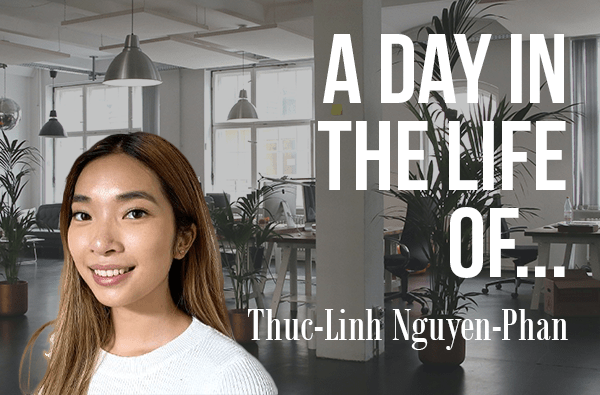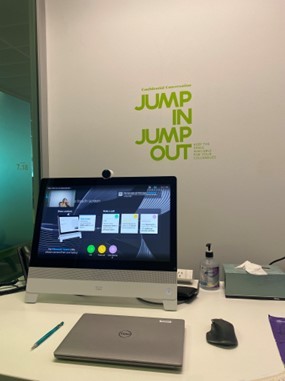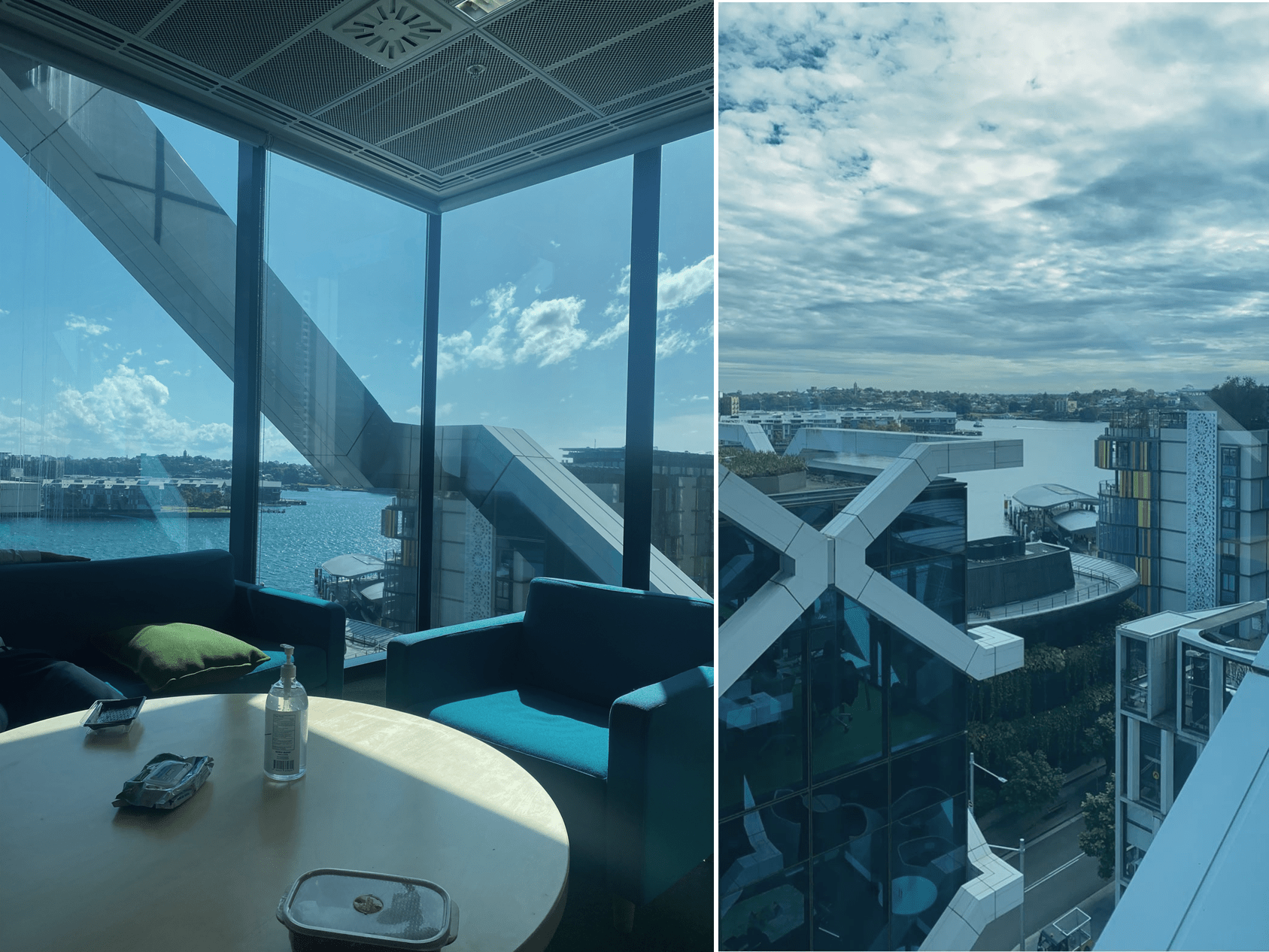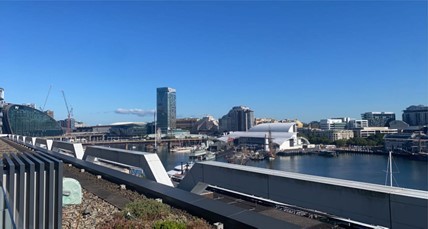
Thuc-Linh Nguyen-Phan
Graduate
University Attended: University of Sydney
Degree qualification: Bachelor of Project Management, Built Environment
Year of graduation: 2021
6:30am
Wake up! Get ready for work including office fit, hair, and makeup. I also always make sure I have my work laptop, notebook, pen, phone, charger and of course air pods.
7:30am
Leave the house and walk to the train station, take the train to the city.
8:30am
Walk from the station to the office.
9:00am
Settle in at a desk and hop on to a zoom call for a daily PMO stand-up. This meeting is updating your team on what you will be focusing on that day or that week.
9:30am
Read through emails and messages to make sure I am up to date and then begin some tasks this would include scheduling new starter calls and getting the new starter access to workspaces (SharePoint, Confluence & Jira) we use on the program. I make sure I go through my to-do list and cross off and add activities I get up to that day. This helps me stay on top of my tasks especially when I get handed a few tasks at a time. I can prioritise and not forget the less demanding tasks.
10:15am
On Mondays, I will take an extract of Risks and Issues from Jira and save them in SharePoint. I will then look over the risk, and issue page, and read over new risks and issues that have been raised over the past week. I will then start drafting up an agenda for the risks and issues triage meeting. This meeting reviews all new risks and issues.
11:00am
I try to find a small meeting room to do my new starter calls, in this call, I welcome the new starter to the program and walk them through our induction pack. This includes all program-level information. After the call, I send the new starter a follow-up email with the induction pack, workspaces, organisation charts and other useful links they would need for future reference.

11:30am
I communicate with the EAs, Communications Manager, and change team who has started on the programme this week and notify them that I will be updating the programme distribution list and stakeholder register with new starters that have started over the past week. After that, I update the resource profile and PMO365 with the new starter information such as role and start date.
12:30pm
Have some lunch, I try my best to not eat at my desk and go to the kitchen with a view of the water. Helps me take some time off the screen. Some days I will bring lunch and other days I will walk out of the building and have some sushi or banh mi. Lunchtime is a bit different every day depending on what meetings and tasks I need to complete that day.

1:00pm
After lunch, I hop onto a call with a team member to work on some Confluence pages and finalise, this involves building and continuous improvements of pages for workstreams to use. Some pages I have been able to help build have been central landing spaces, risk assumptions issues dependencies (RAID) pages, and dashboards for action tracking.
2:oopm
Hop onto another call with my QA Lead, this is where I go through what I’ve been working on and where I can seek help and advice with the tasks I am completing. This session also goes through actions I can complete to help me progress in my career.
3:30pm
After the call, I continue to do some Confluence work that was discussed in my earlier call. On this day, it was going through workstream RAID pages and checking if all filters were correct and displaying the right information. In between this time, I would make some tea with milk and grab some mixed nuts in the kitchen. I try not to skip this as I want to make sure I stand up after an hour or two of sitting.

4:30pm
Read the latest status reports or Steerco slides. Reading these reports helps me stay up to date with what is happening in the program, how it is progressing and the challenges/issues that have come up.
5:00pm
Finish off some tasks and get ready for the next day. This includes checking what meetings I have tomorrow, booking time with team members, and blocking out my calendar.
5:30pm
Most days I will take the train back home but some days I would go to dinner in the city with some friends that also work in the city. I found this is the most convenient way to see your friends when you work full-time. Days I train back home, I would have dinner with my family, relax and head to the gym.
More about Thuc-Linh
What’s your job about?
I am a Graduate at Seven Consulting, a project and program management consultancy company working in Australia’s largest banks, telecommunications companies, and retailers. As a graduate, I work within the PMO of projects and programs. I am currently assigned at a bank, my day-to-day tasks include meeting minute taking, supporting document repositories (such as Sharepoint and Confluence) like maintaining meeting forums agendas and approved minutes, regular data quality checks of risks and issues which include exporting risks and issues from Jira and spot checking which risks and issues that need updating and sending out an action to update them, updating organisational structures for the program as people on-board and changes in the program, creating and maintaining an induction pack for new starters to the program, other activities including supporting the programs when needed.
What’s your background?
I grew up in an immigrant household in the Bankstown- Canterbury area, I live with my parents and two older brothers. Growing up in an immigrant household my goal was to graduate and earn enough to support my parents. I finished school in 2018 and went straight to university in 2019 and graduated in 2021. I think I was lucky enough to have my first year of uni in person before COVID moved the rest of my uni experience online. Although I only had one year of uni fully on campus, I was able to meet a lot of new people with different backgrounds to me and made friends I still stay very much connected to today. I initially picked this degree because I wasn’t sure of what I wanted to do but my uni offered a broad range of majors. This made me realise how broad my career could take me and with its high job demand, I thought I had a lot of bandwidth to move around industries.
Could someone with a different background do your job?
I do think someone with a different background could do my job, the Bachelor of Project Management is a degree that is very new to USYD and other universities. Also, most of the people I work with did not have PM backgrounds but were in IT or business backgrounds and worked their way into PM. Since PM skills and expertise are transferrable across industries it is beneficial when you already have expertise in that industry. Although my degree helped me understand project management, working on real-life projects and programs has been the best learning curve over the past few months.
What’s the coolest thing about your job?
The coolest thing about my job is that I can feel a part of something and that I in some way contributed to a project/program. Building connections with other colleagues is cool as I can learn from them especially if they have lots of experience. The benefits and events you get from my company like social events, UberEATS vouchers, mentors, and buddies.
What are the limitations of your job?
Working from home and in the office has been good, however when you are a graduate you have a lot of questions that stop you from completing tasks. Working from home was challenging in the beginning as I had a lot of questions that sometimes couldn’t be answered immediately. However, this was easier as I settled into the project and was more familiar with processes. It will be challenging at first, but you will be fine.
3 pieces of advice for yourself when you were a student…
3 pieces of advice I would give myself at university is don’t rush into anything you have time, university life is like no other so you should enjoy while it lasts. Uni is for being broke, you have the rest of your life to earn money.
Don’t forget to ask questions about anything uni related or career wise.
Lastly, don’t forget to build those connections and relationships in uni, it may benefit you later in life (stay connected on LinkedIn even).
